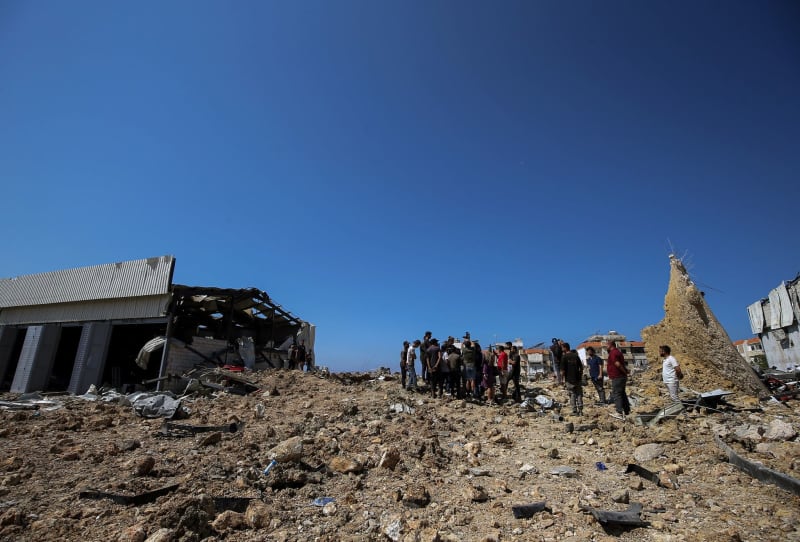Israel’s military chief has ordered troops to prepare for a possible ground offensive in Lebanon as heavy Israeli airstrikes continue for three days and militants attack the cities of Tel Aviv and Eilat.
The attacks on Lebanon and the subsequent reduction in the military power of the Shiite militia group Hezbollah have laid the groundwork for a possible ground attack, Herzi Halevi, chief of staff of the Israel Defense Forces, told troops on Wednesday.
“You can hear the fighter jets above your heads; we are on strike all day,” the IDF chief said during a visit to a troop exercise on the northern border, according to a military statement.
“This is to prepare the ground for your possible accession and to further undermine Hezbollah,” he said.
Earlier, Ori Gordin, the Israeli army commander in the north, had said that the army was mobilizing two additional reserve brigades for missions in the northern area and that troops should be ready for a ground maneuver.
“We have entered a new phase in the operation,” he said. Israel must “change the security situation, and we must be fully prepared for maneuvers and actions.”
Israel’s goal is to allow the approximately 60,000 people displaced in the north by near-daily attacks by the Iranian-backed Hezbollah to return.
The cross-border conflict has been going on for more than 11 months and has forced thousands of Lebanese from their homes.
Hezbollah sources said the militias were “ready to face any possible ground invasion.”
Military conflict flares up, death toll rises
Israeli strikes on Wednesday morning killed 51 people and wounded more than 200, Lebanese Health Minister Firass Abiad said. In total, about 600 people have been killed since the escalation began on Monday, the ministry said.
The latest attacks took place in towns and villages in the south of the country and north of Beirut.
Frontline operations saw not only more Israeli strikes in Lebanon, but also a Hezbollah attack – for the first time – on the Israeli metropolis of Tel Aviv. The IDF said it intercepted the rocket.
In the evening, the southern port city of Eilat was attacked by two drones. One was intercepted, while the other hit the port and exploded, injuring two people and causing a fire, Hagari said.
Reports said they could have been launched from Iraq. Hagari declined to comment. Iran-backed Houthi rebels in Yemen have repeatedly attacked Israel’s southern port city.
But Halevi, who acknowledged Hezbollah’s unprecedented rocket attack on Tel Aviv, said: “Today Hezbollah increased its range of fire and later today they will receive a very strong response. Get ready.”
Hezbollah said the rocket targeted the headquarters of Israel’s foreign intelligence agency Mossad in a Tel Aviv suburb.
The Mossad was responsible for the killing of several militia leaders and for the apparently coordinated mass explosions of communications equipment used by Hezbollah in Lebanon last week, the organization said.
About 110 rockets were fired from Lebanon and some were intercepted, the Israeli military said. One rocket fell near a nursing home near Safed in the north; no injuries were reported.
Hezbollah hides behind Lebanese civilians
Observers and former military officers in Lebanon confirmed the Israeli army’s accusation that Hezbollah is hiding weapons in residential areas.
“(Hezbollah) has no barracks or places to store their weapons because Israel will discover them,” said former Lebanese army Brigadier General Wehbe Katischa, who served in southern Lebanon.
“That’s why their main depots are located between houses and in mountainous areas near residential areas.”
The Hezbollah militia had an estimated 150,000 rockets in the region before the war in Gaza began almost a year ago. The Israeli military has repeatedly said that the strikes in Lebanon would target the militia’s weapons depots.
Israel has long accused Hezbollah of hiding weapons in residential areas and producing rockets there. The Lebanese government has tried to refute some of these accusations.
Thousands of displaced in Lebanon
At least 90,530 people have been displaced since Monday, with nearly 40,000 in 283 reception centres, according to the United Nations.
Nearly 600 people were said to have been killed, including 50 children and 94 women, in almost 1,700 attacks across the country. Humanitarian agencies urgently need at least $170 million to support the ongoing response and respond to emerging needs, the UN said.
The International Committee of the Red Cross (ICRC) said on Wednesday that international humanitarian law makes clear that care must at all times be taken to spare the civilian population and civilian objects when conducting military operations.
No signs of Iranian military intervention so far
Iran’s supreme leader expressed confidence that Hezbollah shows no signs of defeat, despite losing high-ranking commanders to Israeli strikes. However, he made no mention of Iran taking a more active role in the ongoing conflict.
“It was undoubtedly a loss for Hezbollah, but it was not a loss that would lead to defeat,” Ayatollah Ali Khamenei said at a meeting for veterans in Tehran on Wednesday.
Iranian Foreign Minister Abbas Araghchi warned against underestimating Hezbollah. “It is more than capable of destroying the bases and colonies of the Israeli regime,” he wrote on the X platform.
Hezbollah is seen as Iran’s main ally in the Middle East. However, observers say it is unlikely that Tehran will come to its aid in the event of a war between Hezbollah and Israel.

